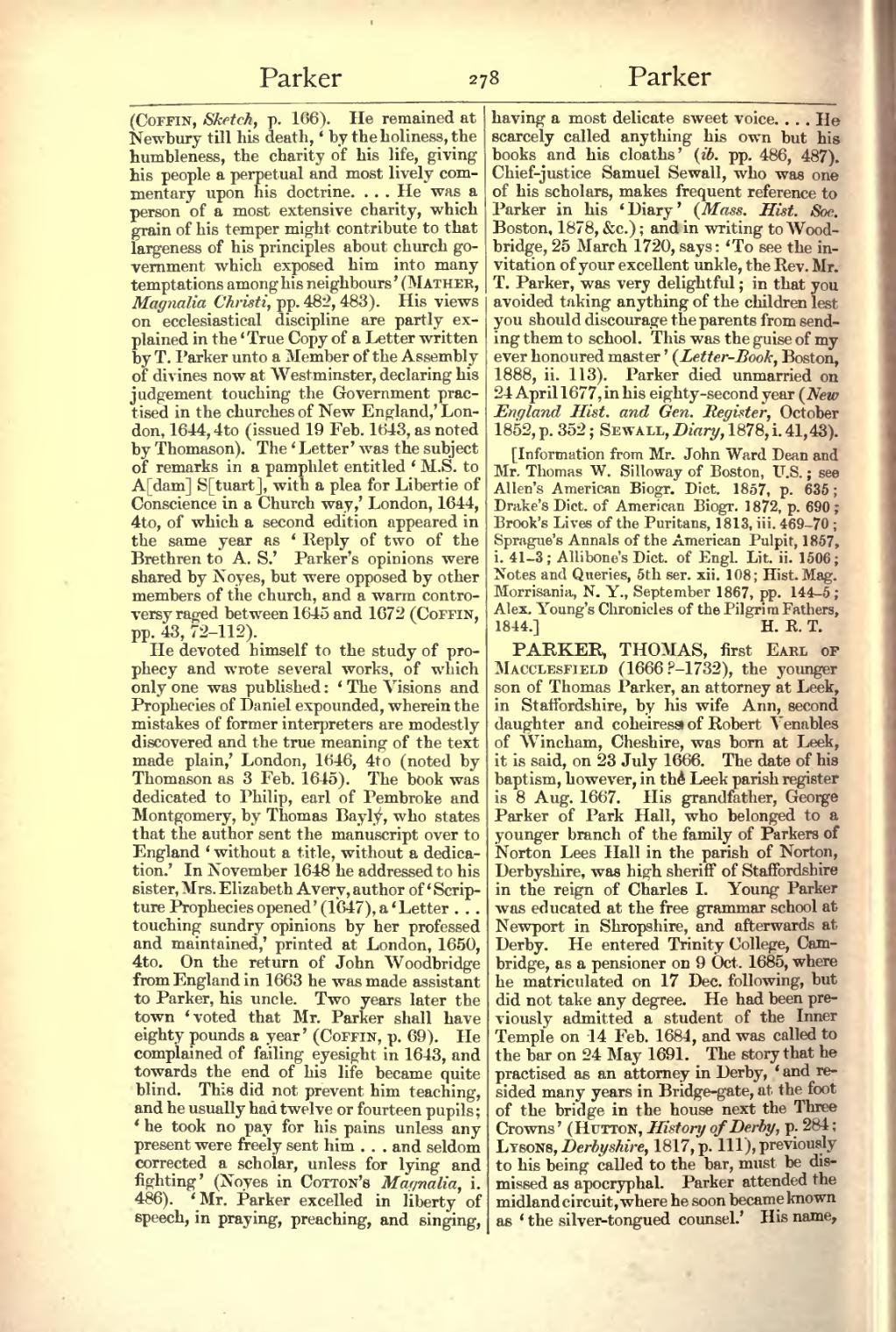(Coffin, Sketch, p. 166). He remained at Newbury till his death, 'by the holiness, the humbleness, the charity of his life, giving his people a perpetual and most lively commentary upon his doctrine. . . . He was a person of a most extensive charity, which grain of his temper might contribute to that largeness of his principles about church government which exposed him into many temptations among his neighbours' (Mather, Magnalia Christi, pp. 482, 483). His views on ecclesiastical discipline are partly explained in the 'True Copy of a Letter written by T. Parker unto a Member of the Assembly of divines now at Westminster, declaring his judgement touching the Government practised in the churches of New England,' London, 1644, 4to (issued 19 Feb. 1643, as noted by Thomason). The 'Letter' was the subject of remarks in a pamphlet entitled ' M.S. to A[dam] S[tuart], with a plea for Libertie of Conscience in a Church way,' London, 1644, 4to, of which a second edition appeared in the same year as 'Reply of two of the Brethren to A. S.' Parker's opinions were shared by Noyes, but were opposed by other members of the church, and a warm controversy raged between 1645 and 1672 (Coffin, pp. 43, 72-112).
He devoted himself to the study of prophecy and wrote several works, of which only one was published: 'The Visions and Prophecies of Daniel expounded, wherein the mistakes of former interpreters are modestly discovered and the true meaning of the text made plain,' London, 1646, 4to (noted by Thomason as 3 Feb. 1645). The book was dedicated to Philip, earl of Pembroke and Montgomery, by Thomas Bayly, who states that the author sent the manuscript over to England 'without a title, without a dedication.' In November 1648 he addressed to his sister, Mrs. Elizabeth Avery, author of 'Scripture Prophecies opened' (1647), a 'Letter . . . touching sundry opinions by her professed and maintained,' printed at London, 1650, 4to. On the return of John Woodbridge from England in 1663 he was made assistant to Parker, his uncle. Two years later the town 'voted that Mr. Parker shall have eighty pounds a year' (Coffin, p. 69). He complained of failing eyesight in 1643, and towards the end of his life became quite blind. This did not prevent him teaching, and he usually had twelve or fourteen pupils; 'he took no pay for his pains unless any present were freely sent him . . . and seldom corrected a scholar, unless for lying and fighting' (Noyes in Cotton's Marginalia, i. 486). 'Mr. Parker excelled in liberty of speech, in praying, preaching, and singing, having a most delicate sweet voice. . . . He scarcely called anything his own but his books and his cloaths' (ib pp. 486, 487). Chief-justice Samuel Sewall, who was one of his scholars, makes frequent reference to Parker in his 'Diary' (Mass. Hist. Soc. Boston, 1878, &c.); and in writing to Woodbridge, 25 March 1720, says: 'To see the invitation of your excellent unkle, the Rev. Mr. T. Parker, was very delightful; in that you avoided taking anything of the children lest you should discourage the parents from sending them to school. This was the guise of my ever honoured master ' (Letter-Book, Boston, 1888, ii. 113). Parker died unmarried on 24 April 1677, in his eighty-second year (New England Hist. and Gen. Register, October 1852, p. 352; Sewall, Diary, 1878, i. 41, 43).
[Information from Mr. John Ward Dean and Mr. Thomas W. Silloway of Boston, U.S.; see Allen's American Biogr. Diet. 1857, p. 635; Drake's Dict. of American Biogr. 1872, p. 690; Brook's Lives of the Puritans, 1813, iii. 469-70; Sprague's Annals of the American Pulpit, 1857, i. 41-3; Allibone's Dict, of Engl. Lit. ii. 1506; Notes and Queries, 5th ser. xii. 108; Hist. Mag. Morrisania, N. Y., September 1867, pp. 144-5; Alex. Young's Chronicles of the Pilgrim Fathers, 1844.]
PARKER, THOMAS, first Earl of Macclesfield (1666?–1732), the younger son of Thomas Parker, an attorney at Leek, in Staffordshire, by his wife Ann, second daughter and coheiress of Robert Venables of Wincham, Cheshire, was born at Leek, it is said, on 23 July 1666. The date of his baptism, however, in the Leek parish register is 8 Aug. 1667. His grandfather, George Parker of Park Hall, who belonged to a younger branch of the family of Parkers of Norton Lees Hall in the parish of Norton, Derbyshire, was high sheriff of Staffordshire in the reign of Charles I. Young Parker was educated at the free grammar school at Newport in Shropshire, and afterwards at Derby. He entered Trinity College, Cambridge, as a pensioner on 9 Oct. 1685, where he matriculated on 17 Dec. following, but did not take any degree. He had been previously admitted a student of the Inner Temple on 14 Feb. 1684, and was called to the bar on 24 May 1691. The story that he practised as an attorney in Derby, ‘and resided many years in Bridge-gate, at the foot of the bridge in the house next the Three Crowns’ (Hutton, History of Derby, p. 284; Lysons, Derbyshire, 1817, p. 111), previously to his being called to the bar, must be dismissed as apocryphal. Parker attended the midland circuit, where he soon became known as ‘the silver-tongued counsel.’ His name,
